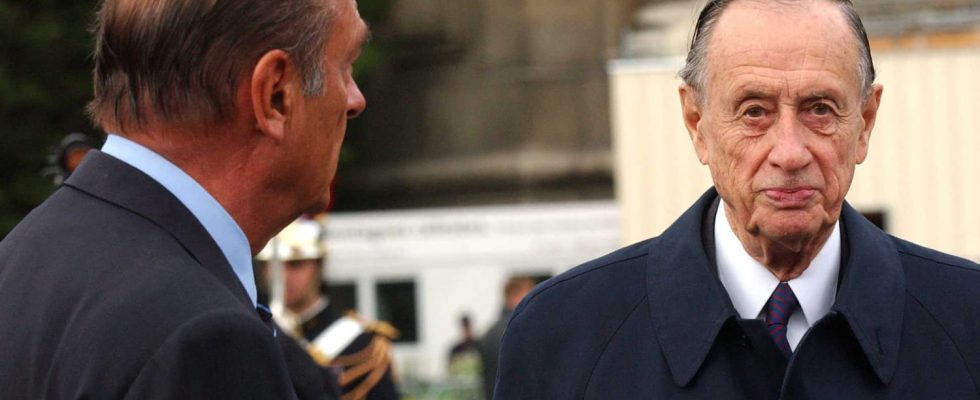Philippe De Gaulle, son of Charles de Gaulle died this Wednesday March 13, 2024. The former admiral of the French Navy was 102 years old.
Born on December 28, 1921, Philippe de Gaulle, son of General De Gaulle, died on the night of Tuesday March 12 to Wednesday March 13, 2024 according to information from BFMTV. He was 102 years old. “He died at the National Institution of Invalides where he had been a resident for two years,” his son Yves de Gaulle told AFP this morning.
Philippe De Gaulle was particularly known for his long and renowned military career which began at the Liberation, particularly in Paris. At the end of the 1960s, he failed to enter politics when a “legitimist” Gaullist party tried to form around him: the Center of Free Republicans. This did not prevent “Admiral” de Gaulle from becoming RPR senator from Paris in 1986. A position he kept until 2004. He had ended his military career much earlier, in 1982.
“I read a lot of history books, I listen to classical music”
His end of life was an opportunity for Philippe De Gaulle to enjoy the simple pleasures of life and to sharpen his curiosity, again and again. Sport, cinema, literature, music… The admiral never stopped learning, until the last day, always in the presence of his family. “When everything is going well, I have visits from my family from time to time. I listen to classical music, I watch the big tennis, rugby and football matches on television. And also the “James Bond” films. , the films of Melville, Louis de Funès like “Le Petit Baigneur”, westerns and documentaries on animals, nature with its distant landscapes, deserts, the Great North” he explained in a major interview granted at Paris Match in November 2020.
Laughing, particularly when he spoke of his regret at having “only done mountaineering on the big screen”, he also indicated having read “a lot of story books” and having responded to “a good part of the mail” that sent him “descendants of free Frenchmen” during the last years of his long and rich life. A journey during which it was sometimes “heavy” to bear the name of General De Gaulle, as he conceded, always in Paris Match. “We don’t choose. Having this name hindered my own freedom, forced me to be very discreet. Besides, I joined the navy to avoid being in the army, where I would have had an impossible life . The navy is turned towards the sea!” he said.
The torments of being the son of a legend
Throughout his life, Philippe De Gaulle lived in the shadow of his father, the General. And how could it have been otherwise? Annoyed at being considered a “son of an archbishop”, he felt belittled. A close friend of the General, Jacques Foccard, recounted a visit that Philippe de Gaulle had made to him, the day after the death of his father, to complain about being only a ship captain, reports Le Monde: “To convince me, he cites the examples of Stalin’s son, who was promoted to general at age 27, and of Eisenhower’s son, who is also a General. I don’t take him for an eagle and he is often clumsy, but he is the son of General. We have to do something for him.” Proof of a meager aura in relation to his father and of a very relative consideration towards him.
This unpleasant feeling of a son oppressed and intimidated in the face of such a father continues even in the private sphere. If he was attentive to the education of his children, General de Gaulle had France close to his heart and was devoted to it. “After kissing me, which he rarely does, he sends me away after fifteen minutes,” he explained. This affection, to say the least measured, constituted the mark of respect and love of a father towards his son in the mind of the General. “Dear old boy” he called him. Quite a symbol.
On the death of his father, Philippe de Gaulle notably inherited the moral rights attached to the General’s work. His memory, his image, his writings as well as his archives. A margin of maneuver which Philippe will take advantage of by publishing a letter that his father sent to him in 1964 and in which he expresses his wish to see him assume “the responsibility of leading France”. A rare mark of confidence on his part, and above all, made public by the Admiral. On the other hand, Philippe was never made a companion of the Liberation by his father. An “oversight” for which the general had justified himself: “Naturally, I could not, my son, make you a companion of the Liberation. Unless posthumously or if you had returned seriously mutilated, and even then! In any case, everyone knows you were my first companion.” Emblem of an unbalanced relationship in which General De Gaulle was always one step ahead, and sparingly disseminated light bursts of tenderness.
